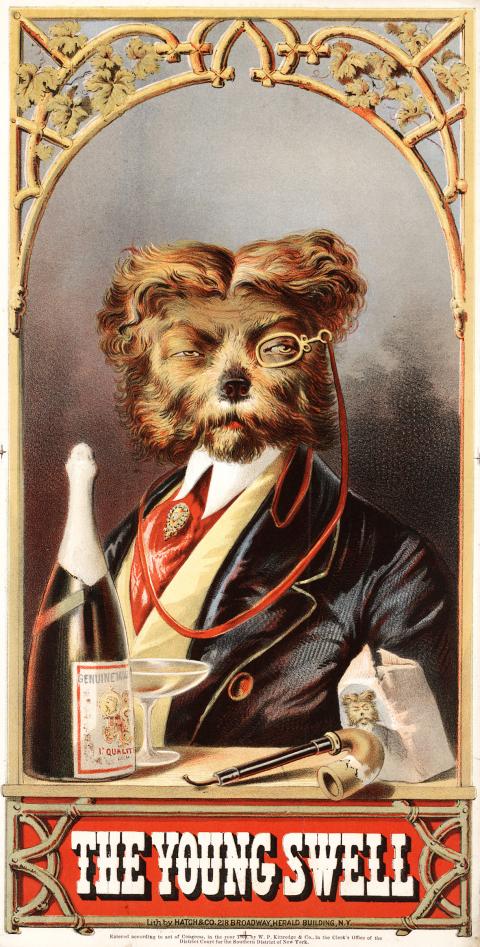Chinese practice
行行出狀元;天無絕人之路;一枝草一點露
in every trade, a master appears; Heaven never bars one’s way; even a blade of grass is nourished with a drop of dew

Photo: Wikimedia Commons
照片:維基共享資源
(hang2 hang2 chu1 zhuang4 yuan2; tian1 wu2 jue2 ren2 zhi1 lu4; yi1 zhi1 cao3 yi1 dian3 lu4)
英國搖滾樂團The Kinks(奇想樂團)一九七八年的「Misfits」(失格),其歌詞是這樣結尾的:
This is your chance, this is your time (這是你的機會,這是屬於你的時機)
So don’t throw it away (所以別錯失了)
You can have your day (你也可以有春風得意的一天)
Yes it’s true what they say (是的,人們說的是真的)
Every dog has his day. (每個人都有出頭天。)
這段歌詞的用意是在鼓勵人、寬慰人──無論運氣多麼糟、人生多麼失敗,每個人總有一天都會在某些事取得成功,無論這些事多麼微不足道。這概念體現在「every dog has its day」這句話中。此語歷史久遠,且出身不凡──它首次見諸文字紀錄,是出自英格蘭女王伊麗莎白一世筆下。
伊麗莎白還是公主時,她寫了一封信,此信隨一五五○年的《Ecclesiastical Memorials》(教會編年誌)出版,信中伊麗莎白寫道:「Notwithstanding, as a dog hath a day, so may I perchance have time to declare it in deeds」(儘管如此,因為人人都有出頭天,所以我或許會有時間以行動表示。)「a dog hath a day」一語或許並非由這未來的女王所創,她寫此信時,這樣的說法很可能已是眾所周知。
伊麗莎白寫下此信後不久,這句話便被收錄在一五六二年版的早期英文諺語聖經──約翰‧海伍德的《Proverbs, Epigrams and Miscellanies》(諺語、箴言與雜錄):「But as every man sayeth a dog hath a day, should a man dispayre [despair] than any [other] day? nay」(但正如大家說的,人人都有出頭天,那麼其他不得志的日子就該懷憂喪志嗎?不。)幾十年後,這句話又出現了,這回是在威廉‧莎士比亞一六○三年的劇作《哈姆雷特》中:「Let Hercules himself do what he may, the cat will mew and dog will have his day」(不管大力士海克力斯他自己怎麼做,貓總會喵喵叫,狗總有得意的一天。)
中文「行行出狀元」的說法也有類似的含義,意謂每種行業都有可能臻於偉大──無論你從事哪種領域的工作,你都有可能表現出色。此語出自一八七八年的清代小說《兒女英雄傳》第十一回:「姑爺,俗話兒說的:『行行出狀元』,又說:『好漢不怕出身低』,那一行沒有好人哪?」
「天無絕人之路」也是激勵人的話,字面意思是「上天永遠不會阻絕人的路」,這是鼓勵人永遠不要放棄希望。台語諺語「一枝草,一點露」,意思是「即使是一片草葉,也有一滴露水滋養」,也是在鼓勵人──即便是一片草葉,也會得到上天照顧;因此同樣地,上天也會眷顧每一個人。
(台北時報林俐凱譯)
你不一定要選填所謂的熱門科系,因為行行出狀元,你只要有熱情,都可以闖出一片天。
(You don’t necessarily need to choose the most popular subject: in every trade, a master appears, as the saying goes. Just work hard, and you’ll do just fine.)
西方有諺語說,「當上帝關了一扇門,必定會再為你打開一扇窗」,意思就是「天無絕人之路」。
(In the West, we have a saying, “When God closes a door, He opens a window,” which means the same as the Chinese idiom “Heaven never bars one’s way.”)
他雖然天生行動不便,但一枝草一點露,憑著不懈的努力,他終於交出傲人的成績。
(Despite his disability, there was reason to take heart, and through his indefatigable spirit he was finally able to succeed.)
英文練習
every dog has its day
The British rock band The Kinks’ 1978 song Misfits ends with the lyric:
“This is your chance, this is your time
So don’t throw it away
You can have your day
Yes it’s true what they say
Every dog has his day.”
The words are meant as encouragement, with the reassuring message that everyone, no matter how poor their luck, no matter how unsuccessful they have been in life, will succeed at something, however small, one day. This idea is encapsulated in the phrase “every dog has its day.” It’s an old phrase with, etymologically speaking, quite an impressive pedigree: its first recorded use was by Queen Elizabeth I of England, no less.
In a letter written when she was still a princess, and published in 1550 in Ecclesiastical Memorials, Elizabeth wrote, “Notwithstanding, as a dog hath a day, so may I perchance have time to declare it in deeds.” The future queen probably did not coin the phrase, as it was likely a known saying at the time she wrote it.
Shortly after Elizabeth’s letter, the saying was included in the 1562 edition of the Bible of early English proverbs, John Heywood’s Proverbs, Epigrams and Miscellanies, as “But as every man sayeth a dog hath a day, should a man dispayre [despair] than any [other] day? nay.” Several decades later, the phrase appears again, this time in William Shakespeare’s 1603 play Hamlet, with
“Let Hercules himself do what he may,
the cat will mew and dog will have his day.”
The Chinese phrase 行行出狀元 (in every trade, a master appears) has a similar meaning, suggesting that there is potential for greatness in every endeavor. It suggests that whatever field you are in, you have the potential of excelling in some way. It originates from a quote in Chapter 11 of the 1878 Qing Dynasty novel ernu yingxiong zhuan (The Story of Boy and Girl Heroes), which reads 姑爺,俗話兒說的:『行行出狀元』,又說:『好漢不怕出身低』,那一行沒有好人哪? (Young sir, it is said that “in every trade, a master appears,” and that “the capable care not about their lowly backgrounds,” so tell me, is there any trade without a good man?”)
The phrase 天無絕人之路 is another that offers encouragement. Literally “Heaven never bars one’s way,” it carries the message that one should never give up hope. The Taiwanese saying 一枝草,一點露, meaning “even a blade of grass is nourished with a drop of dew” is similarly encouraging, suggesting that if even a blade of grass is looked after, then Heaven will take care of a person.
(Paul Cooper, Taipei Times)
He’s got one over on me this time, but I’ll get him back in the end. Every dog has its day, and I’m going to make him pay.
(這次讓他得逞了,可是我總會贏回來的。風水輪流轉,我會要他付出代價。)

A: What types of fruit enzymes should we take to help reduce eye floaters? B: According to a study published in the “Applied Sciences” journal by Taiwanese ophthalmologist Horng Chi-ting, pineapple, papaya and fig supplements can improve symptoms. A: Pineapples are in season now, so you should munch on more of those to get rid of floaters. B: Not quite. Enzymes can be damaged by our stomach acid if we eat the fruit directly. The doctor says taking fruit enzyme capsules is better for absorption. A: Most importantly, we should reduce our use of personal electronics to prevent floaters from

Rice is essential to Japanese culture, tradition and politics. People take pride in the oval-shaped sticky Japonica grain, which is still a staple even though total consumption has fallen over the decades. But since last summer, prices have soared as supplies have fallen short of demand. The government has long paid farmers to cut back on rice acreage, and change to other crops to keep rice prices relatively high. To cope with shortfalls this year, the government has released rice reserves. But the grain has been slow to reach supermarket shelves. Anger over that was part of the reason the Agriculture Minister

In Taiwan, 7-Eleven convenience stores can be found on almost every street corner. With over 84,600 stores across 20 countries, 7-Eleven has more locations than any other retail business on Earth. For millions of people, the chain is an important part of daily life, providing coffee, quick meals, and essential items for those __1__. The history of 7-Eleven began nearly 100 years ago in Dallas, Texas. In 1927, the Southland Ice Company began selling blocks of ice that were used to keep fridges cool. Shortly after opening, the company __2__ its offerings to include groceries like milk, eggs, and

Continued from yesterday(延續自昨日) https://www.taipeitimes.com/News/lang In 1946, the company adopted the name 7-Eleven to reflect its newly extended __3__, from 7am to 11pm, a novel concept at the time. As a rapidly growing company, it began offering franchise opportunities in the 1960s. In 1974, the first 7-Eleven in Japan was opened by the supermarket company Ito-Yokado. The Japanese franchises were __4__ successful that by 1991, Ito-Yokado was able to acquire a 70 percent stake in Southland Corporation. Its investments eventually resulted in full ownership of 7-Eleven, which paved the way for the Japanese company to enter the international market. Since then, 7-Eleven